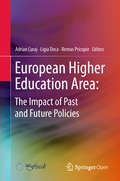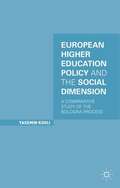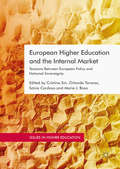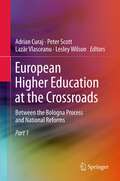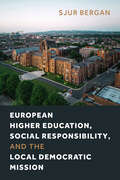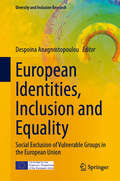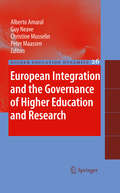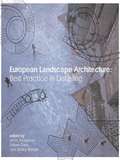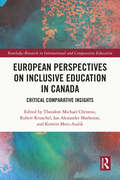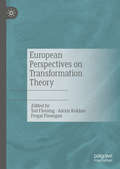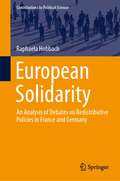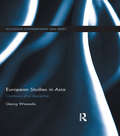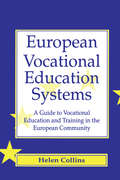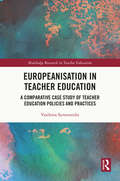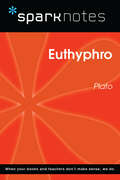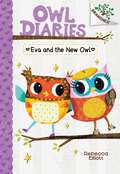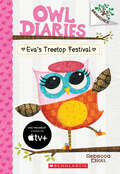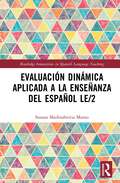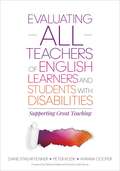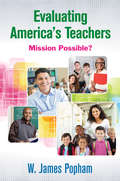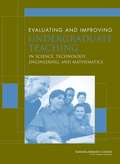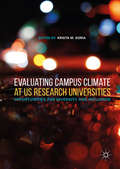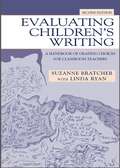- Table View
- List View
European Higher Education Area: The Impact of Past and Future Policies
by Adrian Curaj Ligia Deca Remus PricopieThis volume presents the major outcomes of the third edition of the Future of Higher Education – Bologna Process Researchers Conference (FOHE-BPRC 3) which was held on 27-29 November 2017. It acknowledges the importance of a continued dialogue between researchers and decision-makers and benefits from the experience already acquired, this way enabling the higher education community to bring its input into the 2018-2020 European Higher Education Area (EHEA) priorities. The Future of Higher Education – Bologna Process Researchers Conference (FOHE-BPRC) has already established itself as a landmark in the European higher education environment. The two previous editions (17-19 October 2011, 24-26 November 2014), with approximately 200 European and international participants each, covering more than 50 countries each, were organized prior to the Ministerial Conferences, thus encouraging a consistent dialogue between researchers and policy makers. The main conclusions of the FOHE Conferences were presented at the EHEA Ministerial Conferences (2012 and 2015), in order to make the voice of researchers better heard by European policy and decision makers. This volume is dedicated to continuing the collection of evidence and research-based policymaking and further narrowing the gap between policy and research within the EHEA and broader global contexts. It aims to identify the research areas that require more attention prior to the anniversary 2020 EHEA Ministerial Conference, with an emphasis on the new issues on rise in the academic and educational community. This book gives a platform for discussion on key issues between researchers, various direct higher education actors, decision-makers, and the wider public. This book is published under an open access CC BY license.
European Higher Education Policy and the Social Dimension
by Yasemin KooijThe Bologna Process has significantly shaped recent higher education policies across Europe, but the area of the social dimension has so far been neglected. Drawing on a cross-country case study (Finland, Germany and Turkey), this book examines the major Bologna reforms, in particular the social dimension, and whether this aspect has successfully been incorporated into policy. Discussing key themes, actors, goals, policies and agendas and setting out recommendations, this book examines the social dimension as a component of the Bologna Process.
European Higher Education and the Internal Market: Tensions Between European Policy and National Sovereignty (Issues in Higher Education)
by Orlanda Tavares Cristina Sin Sónia Cardoso Maria J. RosaThis book analyses European higher education policies and their three main drivers: the European Commission, the European Court of Justice and the building of the European Higher Education Area through the Bologna Process. Central to the volume is the issue of European institutions’ intervention in higher education: building a common area for higher education in a domain protected by subsidiarity is no easy task, and one that must consider the supra-national, national and institutional levels that all play a role in policy implementation. In this volume, the editors and contributors navigate within the tensions between the establishment of an internal market on the one hand and national sovereignty on the other. This volume will surely be of interest and value to those studying and working in the area of higher education policy and understanding relationships between European institutions and member states.
European Higher Education at the Crossroads
by Peter Scott Adrian Curaj Lesley Wilson Lazăr VlasceanuRomania hosts the 2012 Bologna / European Higher Education Area Ministerial Conference and the Third Bologna Policy Forum. In preparation for these meetings, The Executive Agency for Higher Education, Research, Development and Innovation Funding (UEFISCDI) organised the Future of Higher Education - Bologna Process Researchers' Conference (FOHE-BPRC) in Bucharest on 17-19 October 2011, with the support of the European University Association (EUA) and the Romanian National Committee for UNESCO. The conference brought the voices of researchers into international-level policy making in higher education. The results of the conference are presented in this book. Until now, empirical evidence supporting policies and reforms in higher education has often been a matter of local or regional focus. The development of a pan-European process in higher education policy drives a need to explore wider research topics on which to base policies. This book offers an unprecedented opportunity for higher education researchers to interact and contribute to the political process shaping the European Higher Education Area (EHEA), and to national policy agendas in more than 100 participant countries for the 2012 ministerial events. The book collects more than 50 articles focusing on vital issues in European higher education. These are arranged in sections addressing the European Higher Education Area (EHEA) Principles; Teaching and Learning; Quality Assurance; Mobility; Higher Education Governance in the EHEA; Funding of Higher Education; Diversification of Higher Education Missions; Higher Education Futures and Foresight.
European Higher Education, Social Responsibility, and the Local Democratic Mission (Higher Education, Place, and Social Responsibility)
by Sjur BerganEducation is about more than preparing students for the labor market; it is about preparing them to be active citizens in democratic societies, to engage in personal growth, and to develop a broad, advanced knowledge base. As Sjur Bergan emphasizes in European Higher Education, Social Responsibility, and the Local Democratic Mission, advocacy is required to ensure that higher education institutions meet these goals through cooperation with their local communities. Bergan outlines the political and institutional complexity of European universities. He explains how history, cultural traditions, and national identities impact education across Europe. He also describes the roles of the Council of Europe and U.S. higher education in the development of a transatlantic cooperation on the democratic mission of higher education. Other chapters explore education programs for developing and maintaining democracy and human rights, pragmatic and creative ways that European universities are working with their local communities, and the development of education opportunities for refugees. Ultimately, Bergan’s book explores not only the local democratic mission of higher education as it has developed in Europe, but also how it could continue to develop, and why it is important it does so. In the series Higher Education, Place, and Social Responsibility.
European Identities, Inclusion and Equality: Social Exclusion of Vulnerable Groups in the European Union (Diversity and Inclusion Research)
by Despoina AnagnostopoulouThe volume takes an interdisciplinary and intersectional approach to recent trends in European identities, social exclusion and poverty on the one hand, and social rights and equality legislation and policies in the European Union on the other. It examines whether legal instruments and policies can effectively address structural discrimination and social exclusion, explores their interplay with identity politics and stereotypes, and examines how legal principles and policies translate into societal progress and inclusion at both the EU and national levels. The book highlights the social rights safeguarded in the European Pillar of Social Rights, the EU Charter of Fundamental Rights and the Council of Europe's European Social Charter, as well as the role of EU and national courts in interpreting social rights and non-discrimination legislation. Using case studies from Greece, Italy and Spain, the book examines state and civil society initiatives to combat poverty and marginalization. The book will appeal to students, researchers and academics in political science, law, sociology and education, as well as policy-makers and practitioners interested in equality and social policies aimed at combating social exclusion, marginalization and poverty.
European Integration and the Governance of Higher Education and Research
by Guy Neave Peter Maassen Christine Musselin Alberto AmaralThe present volume aims at analysing the change process which the European university is undergoing as a consequence of European integration efforts. In the case of higher education, these have materialised, amongst other things, in the implementation of the Bologna process, while the Lisbon summit also has important consequences for the university. Given the overall ambitions and goals of the Lisbon agenda and the Bologna process, and other relevant supranational and intergovernmental European integration processes, it is obvious that these processes have the intention to affect the university in all its basic structural features, including the way it performs its basic activities. However, the European Commission does not have a formal authority with respect to the university, nor did the governments that signed the Bologna process develop an executive administrative capacity for implementing the Bologna Declaration. As a consequence, whether and how the supranational and intergovernmental European integration processes actually affect university governance and the university as a social institution, is far from clear. This book discusses the nature and possible effects of these very complex processes by analysing the many facets and levels of higher education policy making in the European Union and a number of case studies that focus on the responses of higher education systems to external pressures for change originating from the integration process.
European Landscape Architecture: Best Practice in Detailing
by Ian H. Thompson Torben Dam Jens Balsby NielsonDrawing together case studies from all over Europe, this text explores the relationship between the overall idea of the landscape architecture for a site and the design of details. Examining concept sketches and design development drawings in relation to the details of the design, the book offers a more profound understanding of decision making through all stages of the design process. The book includes the study of the choice of materials and techniques of construction, and explores the cultural and symbolic significance of such choices, as well as questions of environmental sustainability. With projects analyzed and evaluated here that have won international acclaim, or have been awarded national prizes, European Landscape Architecture is a core book in the study and understanding of the subject.
European Perspectives on Inclusive Education in Canada: Critical Comparative Insights (Routledge Research in International and Comparative Education)
by Theodore Michael ChristouFeaturing leading voices in the field from across Canada and Europe, this edited collection offers empirical analyses of the historical, social, cultural, and legislative determinants of inclusive education in Canadian schools. Covering four thematic areas including the structure, culture, and practices of inclusive education, the volume offers comparative insights from a European perspective, engaging critically with widely held views of Canada as a world leader in inclusive education. Providing rich comparisons with educational systems in Germany, Spain, and Finland, chapters explore in-depth the assessment structures and curricula specific to Canada, as well as educational policy, and explore attitudes and practices in relation to diverse student populations, including refugee and indigenous peoples, and students with special educational needs. This volume will benefit researchers, academics, and educators with an interest in multicultural education, international and comparative education, as well as educational policy more specifically. Those involved with inclusion and special educational needs will also benefit from this volume.
European Perspectives on Transformation Theory
by Ted Fleming Fergal Finnegan Alexis KokkosThis book offers a concise and comprehensive exploration of the theory of transformative learning by European researchers. Exploring Mezirow’s theory of transformative learning as a ‘living theory’, the editors and contributors ask whether there a uniquely European perspective on this theory that reflects Europe’s traditions and contexts. What is the nature of that perspective, and how is it similar or different to those espoused in the USA? This book outlines how the theory of transformative learning has been developed by European researchers, and how it has built upon, critiqued, and enriched the Transformation Theory proposed by Mezirow. Consequently, this volume outlines new theoretical perspectives for the future evolution of transformative learning and explores theoretical perspectives that can be put into practice in a range of fields. This wide-ranging volume will be of interest and value to all those interested in transformative learning theory.
European Policy Implementation and Higher Education
by Alberto Amaral Cristina Sin Amélia VeigaThis book presents a critical analysis of the implementation of the Bologna Process, its achievements and consequences, as well as its failures and lack of convergence problems. Over the last decade the implementation of the Bologna Process, an ambitious reform of European higher education systems, has attracted attention from politicians, academics, students and scholars in higher education policy. Taking Portugal as a case study, the book includes an analysis of the perceptions and the practices, formed at the institutional level in respect of the key objectives laid down at the European level, namely employability, mobility and attractiveness.
European Solidarity: An Analysis of Debates on Redistributive Policies in France and Germany (Contributions to Political Science)
by Raphaela HobbachThis book addresses the central question of European solidarity in the face of a multitude of crises in Europe and focuses on its discursive manifestation in public debates. It is the first to systematically examine national debates on redistributive policies in the EU and the role of European solidarity within them by analysing French and German parliamentary debates on redistributive EU policies during the euro crisis and the migration crisis. By doing so, the book addresses the question of how relevant the idea of European solidarity is when redistributive policies in the EU are discussed at the national level and examines the conditions under which it is ascribed more or less relevance. Moreover, the book reveals that what European solidarity actually means in practice is often highly contested.
European Studies in Asia: Contours of a Discipline (Routledge Contemporary Asia Series)
by Georg WiessalaAs countries across Asia continue to rise and become more assertive global powers, the role that Higher Education has played, and continues to play, in this process is an issue of growing pertinence. Furthermore, understanding the relationship between Europe and Asia fostered by historical and contemporary knowledge transfer, including Higher Education, is crucial to analysing and encouraging the progress of both regional integration and inter-regional cooperation. With a specific focus on international Higher Education, European Studies in Asia investigates knowledge transfer and channels of learning between Europe and Asia from historical, contemporary and teaching perspectives. The book examines a selection of significant historical precedents of intellectual dialogue between the two regions and, in turn, explores contemporary cross-regional discourses both inside and outside of the official frameworks of the European Union (EU) and the Asia--Europe Meetings (ASEM). Drawing on extensive case studies based on many of his own teaching experiences, Georg Wiessala addresses key questions, such as the nature and construction of the European Studies in Asia curriculum; aspects of ‘values’, co-constructed learning and adult pedagogy in the discipline of European Studies in Asia; the politics of Asian host cultures, the ‘internationalization’ of Asian Higher Education and the experiences and expectations of tertiary sector students of this subject in Asia, Australia and New Zealand. In doing so, the author articulates a range of outcomes for the further development of Higher Education cooperation agendas between Asia and Europe, in the discipline of European Studies, and in related fields such as International Relations. This case study-led book makes an original and novel contribution to our understanding of European Studies in Asia. As such, it will be of great interest to students and scholars of Asian Education, Comparative Education, European Studies and International Relations.
European Vocational Educational Systems
by Collins, HelenThis detailed reference work describes the vocational training systems available in EC member states. It deals with the vocational qualification systems within each country and outlines EC programmes that promote the recognition of training schemes.
Europeanisation in Teacher Education: A Comparative Case Study of Teacher Education Policies and Practices (Routledge Research in Teacher Education)
by Vasileios SymeonidisThis book explores the phenomenon and process of Europeanisation in the field of teacher education. Drawing on comparative case studies in Austria, Greece and Hungary, it examines empirical data and analyses key themes around the continuum of teacher education, the development of teacher competence frameworks, and the support to teacher educators. The book is the first of its kind to systematically research the landscape of European teacher education, exploring the interactions between national and European influences in the trajectory of teacher education policy and practice. Chapters offer an original and in-depth understanding of European influences that draw on evidence from policy documents and interviews with relevant stakeholders. It argues that teacher education systems are being Europeanised, although at different speeds and directions for each country. Factors such as the socio-political and economic contexts, historical traits and policy actors’ preferences at both national and institutional levels determine the translation process. This book will be of great interest for academics, educational researchers, practitioners and policymakers in Europe and beyond, informing wider discussions about the emerging European context in teacher education, education policy and what it means to be a European teacher.
Euthyphro (SparkNotes Philosophy Guide)
by SparkNotesEuthyphro (SparkNotes Philosophy Guide) Making the reading experience fun! SparkNotes Philosophy Guides are one-stop guides to the great works of philosophy–masterpieces that stand at the foundations of Western thought. Inside each Philosophy Guide you&’ll find insightful overviews of great philosophical works of the Western world.
Eva And The New Owl (Owl Diaries #4)
by Rebecca ElliottPick a book. Grow a Reader! This series is part of Scholastic's early chapter book line Branches, aimed at newly independent readers. With easy-to-read text, high-interest content, fast-paced plots, and illustrations on every page, these books will boost reading confidence and stamina. Branches books help readers grow! In book #4, a new owl named Hailey starts in Eva's class at school. Eva is always happy to meet new people, and she's excited to make a new friend! But the new owl befriends Lucy instead of her. So Eva gets jealous. Lucy is Eva's best friend! Will Eva lose her best friend? Or can Eva and Lucy BOTH make a new friend?
Eva's Treetop Festival: A Branches Book (Owl Diaries #1)
by Rebecca ElliottThis adorable early chapter book series is perfect for young girls who love friendship stories starring animal characters!This series is part of Scholastic's early chapter book line called Branches, which is aimed at newly independent readers. With easy-to-read text, high-interest content, fast-paced plots, and illustrations on every page, these books will boost reading confidence and stamina. Branches books help readers grow!Eva Wingdale gets in over her head when she offers to organize a spring festival at school. Even with her best friend Lucy's help, there is NO way she will get everything done in time. Will Eva have to ask Sue (a.k.a. Meanie McMeanerson) for help? Or will the festival have to be cancelled? This book is written as Eva's diary -- with Rebecca Elliott's owl-dorable full-color illustrations throughout!
Evaluación dinámica aplicada a la enseñanza del español LE/2 (Routledge Innovations in Spanish Language Teaching)
by Susana Madinabeitia MansoEvaluacion dinamica aplicada a la ensenanza del espanol LE/2 explora el concepto de evaluación dinámica o diálogo colaborativo entre docente y aprendiente que va dirigido a favorecer el desarrollo lingüístico del aprendiente proporcionándole apoyo durante el proceso de evaluación.Este volumen explica cómo usar la evaluación como herramienta de orientación para favorecer un aprendizaje autorregulado y contiene recomendaciones prácticas para el diseño de pruebas y procedimientos de calificación dinámicos. Ofrece una revisión de las últimas perspectivas en el campo de la evaluación dinámica para español como lengua adicional y presenta implementaciones innovadoras y recursos actualizados para contextos de evaluación y examinación, incluidas rúbricas, escalas de evaluación y calificación, y modelos de examen. Enmarcada en la teoría sociocultural, esta monografía logra un equilibrio entre las discusiones teóricas, metodológicas y empíricas y es la primera obra dedicada a la introducción del dinamismo en la evaluación del español como lengua adicional de distintos modos comunicativos.Este volumen se dirige a estudiantes de posgrado, docentes, investigadores y administradores o directores de programas de lenguas interesados en la evaluación del español como lengua adicional, tanto desde un punto práctico como teórico.____________________________________________________________________________________________Evaluación dinámica aplicada a la enseñanza del español LE/2 explores the concept of Dynamic Assessment in Spanish LE/2 which is designed to promote linguistic development in language learners using collaborative dialogue between instructors and students.This volume discusses how to use assessment as a guidance tool to promote self-regulated learning and offers practical recommendations for the design of tests and dynamic grading procedures. It provides a review of the latest perspectives in the field of dynamic assessment for Spanish LE/2 and presents innovative implementations and up-to-date resources for assessment and examination, including practical assessment tools such as rubrics, scales of assessment and grading, and examination models. Framed in sociocultural theory, this book achieves a balance between theoretical, methodological and empirical discussions and is the first volume dedicated to the introduction of dynamism in the evaluation of different communicative modes in Spanish.This is the ideal volume for language program directors, language instructors, and postgraduate students interested in assessment models in Spanish language teaching, both from a practical and theoretical point of view.
Evaluating ALL Teachers of English Learners and Students With Disabilities: Supporting Great Teaching
by Diane Staehr Fenner Peter L. Kozik Ayanna C. CooperUnique Student Strengths and Needs Require Unique Teacher Evaluation Methods. Teacher evaluation should never be used in a “one-size-fits-all” manner, especially when evaluating all teachers who work with English Learners (ELs) and students with disabilities. Evaluations of all teachers who work with diverse learners require unique considerations. Such considerations are precisely what you’ll learn in this comprehensive, action-oriented book. Backed by research and case studies, the authors detail: Four Principles for Inclusive Teacher Evaluation of diverse learners compatible with the Danielson and Marzano frameworks Specialized “look-fors” evaluators can use and adapt to recognize effective teaching of diverse learners Strategies for coaching teachers who need more support reaching diverse learners
Evaluating ALL Teachers of English Learners and Students With Disabilities: Supporting Great Teaching
by Diane Staehr Fenner Peter L. Kozik Ayanna C. CooperUnique Student Strengths and Needs Require Unique Teacher Evaluation Methods. Teacher evaluation should never be used in a “one-size-fits-all” manner, especially when evaluating all teachers who work with English Learners (ELs) and students with disabilities. Evaluations of all teachers who work with diverse learners require unique considerations. Such considerations are precisely what you’ll learn in this comprehensive, action-oriented book. Backed by research and case studies, the authors detail: Four Principles for Inclusive Teacher Evaluation of diverse learners compatible with the Danielson and Marzano frameworks Specialized “look-fors” evaluators can use and adapt to recognize effective teaching of diverse learners Strategies for coaching teachers who need more support reaching diverse learners
Evaluating America’s Teachers: Mission Possible?
by W. James PophamWhen teacher evaluations are fair, everyone wins. Poor evaluation systems don’t just hurt teachers—they hurt students, too. That’s why America can’t afford to wait for the teacher-evaluation problem to be solved. To provide balanced, accurate, and rigorous evaluations that take into account each teacher’s particular circumstances, only one system can work: evidence-governed collegial judgment. This book includes: A discussion of common evaluation systems, including testing, value-added models, and observations Analysis of federal guidelines and state responses Action steps teachers and school leaders can take to influence policy A clear rationale and strategies for implementing a teacher evaluation model based on human judgment
Evaluating And Improving Undergraduate Teaching: In Science, Technology, Engineering, And Mathematics
by Technology Engineering Committee on Recognizing Evaluating Rewarding Developing Excellence in Teaching of Undergraduate Science MathematicsEconomic, academic, and social forces are causing undergraduate schools to start a fresh examination of teaching effectiveness. Administrators face the complex task of developing equitable, predictable ways to evaluate, encourage, and reward good teaching in science, math, engineering, and technology.Evaluating, and Improving Undergraduate Teaching in Science, Technology, Engineering, and Mathematics offers a vision for systematic evaluation of teaching practices and academic programs, with recommendations to the various stakeholders in higher education about how to achieve change.What is good undergraduate teaching? This book discusses how to evaluate undergraduate teaching of science, mathematics, engineering, and technology and what characterizes effective teaching in these fields.Why has it been difficult for colleges and universities to address the question of teaching effectiveness? The committee explores the implications of differences between the research and teaching cultures-and how practices in rewarding researchers could be transferred to the teaching enterprise.How should administrators approach the evaluation of individual faculty members? And how should evaluation results be used? The committee discusses methodologies, offers practical guidelines, and points out pitfalls.Evaluating, and Improving Undergraduate Teaching in Science, Technology, Engineering, and Mathematics provides a blueprint for institutions ready to build effective evaluation programs for teaching in science fields.
Evaluating Campus Climate at US Research Universities: Opportunities for Diversity and Inclusion
by Krista M. SoriaThis book examines campus climate data collected from undergraduates at several large, public research universities across the nation to enhance understanding of the long-term impact of campus climate on student success. Many universities have refocused their attention and energy on campus climate, defined in this volume as students’ perceptions of how welcoming and respectful their campus environments are for students from different social identities. As structural diversity continues to grow more complex on college campuses around the nation, campus leaders have begun to take more steps to understand campus climate and address persistent inequalities, acts of discrimination, and violence against students from diverse backgrounds. The authors in this volume address initiatives to improve campus climate and provide empirical evidence on the effectiveness of those programs.
Evaluating Children's Writing: A Handbook of Grading Choices for Classroom Teachers
by Suzanne Bratcher Linda RyanEvaluating Children's Writing: A Handbook of Grading Choices for Classroom Teachers, Second Edition introduces and explains a wide range of specific evaluation strategies used by classroom teachers to arrive at grades and gives explicit instructions for implementing them. Samples of student writing accompany the instructions to illustrate the techniques, and an appendix of additional student writing is provided to allow readers to practice particular evaluation strategies.More than just a catalog of grading options, however, this is a handbook with a point of view. Its purpose is to help teachers become intentional about their grading practices. Along with recipes for grading techniques, it offers a philosophy of evaluating student writing that encourages teachers to put grading into a communication context and to make choices among the many options available by determining the instructional purpose of the assignment and considering the advantages and disadvantages of particular grading strategies. Specific grading techniques are integrated with suggestions about the craft of evaluation--guidelines for instructional objectives, for student audience analysis, and for teacher self-analysis that help define communication contexts.New in the Second Edition:*a new chapter on state standards and assessments;*a reorganization of the chapter on approaches to grading;*additions to the chapter on management systems;*additions to the chapter on teaching yourself to grade;*additions to the annotated bibliography; and*updated references throughout the text.
